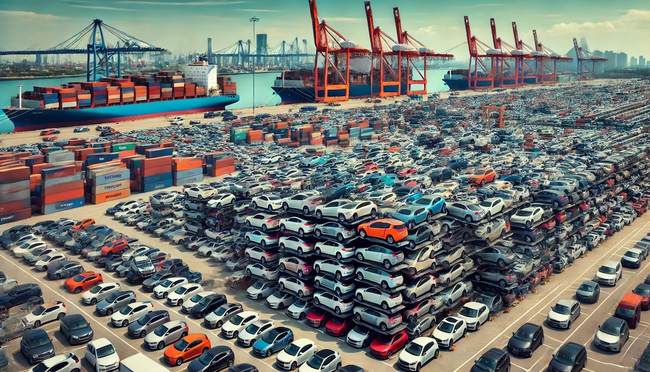We support our Publishers and Content Creators. You can view this story on their website by CLICKING HERE.

The operator of one of the world’s busiest seaports changed its entire landscape to handle its “precious cargo” of imported electric vehicles from China, including “constructing a dozen wind turbines on the quayside; on-site battery recharging options; quality control and a ruthless hunt for the slightest defect to deliver ready-to-use cars to customers.”
Advertisement
Only to see unsold electric cars stacking up like pancakes.
The Belgian port of Zeebrugge handles up to three million EVs each year, moving them off of cargo ships and onto trucks for delivery to impatient dealers and their happy customers. “This is the future,” a vehicle processing center manager told Euronews on Tuesday.
The future seems to be arriving a bit late, unlike the unending stream of unwanted EVs to Zeebrugge’s processing centers.
“Instead of supplying an endless stream of China-made EVs to buyers,” the report continued, “rows and rows of automobiles gather dust in the car park, reportedly due to oversupply.”
Reportedly? Do they think we’re stoned?
There are a couple of things going on here. One is geopolitical and is comparatively easy to deal with. The other is something from Econ 101 so basic that even your typical journalist should vaguely remember it from freshman year — but that also makes it a bit more difficult for Eurocrats to come to grips with.
Let’s do the geopolitics first because I do like my big fancy words.
Communist China has a little problem that it’s trying to solve by exporting it to the rest of the world: Chinese consumers aren’t spending.
One reason is cultural. Chinese have always had a high savings rate. The other is situational. Chinese consumers are saving even more than usual after Xi Jinping’s long and brutal COVID lockdowns because, under his whimsical rule, you can never be sure when the next lockdown will come so you’d better have plenty of yuan in the bank or under the mattress.
Advertisement
Recommended: Harris Keeps Embarrassing Herself and… IMPROVING IN THE DAMN POLLS?
So China has all of this excess industrial capacity, and rather than close factories and throw people out of work, China is dumping products into foreign markets. The hope is that Beijing can paper over its losses longer than foreign industries can survive the deluge.
Beijing also wants to dominate the EV market, and dumping cheap EVs in Europe and America might crush our domestic automobile makers.
The solution is to slap tariffs on China’s (likely illegally) dumped EVs until their batteries scream, and that’s already begun.
One of the first lessons in Econ 101 is a little something called market-clearing price. That’s when supply and demand are in equilibrium — widgets are purchased at the same rate they’re being made, without gluts or shortages.
Even with all the government incentives tacked on, we have yet to find the market-clearing price for EVs. Demand hasn’t grown to meet production — which is an admittedly difficult task when governments are mandating unrealistic production goals. People aren’t even snapping up cheap Chinese EVs, indicating that the price floor is perhaps much lower than current production costs.
It looks increasingly like there’s a big correction coming.
Advertisement
But Eurocrats (and would-be world-savers in Washington) can’t resist fiddling with markets, whether to please their constituents, salve their egos, or line their pockets. So it might be a long time, if ever, before the EV market finds equilibrium.
Meanwhile, cars keep stacking up at Zeebrugge, and I can’t stop laughing at how expensive and unnecessary it all is.
P.S.: PJ Media was founded in the wake of Rathergate to protect free speech from government regulators and mainstream media gatekeepers alike. Help us keep up the fight during our 60% off FIGHT promotion. If you’re already a member, thank you so much for your support.

 Conservative
Conservative  Search
Search Trending
Trending Current News
Current News 







